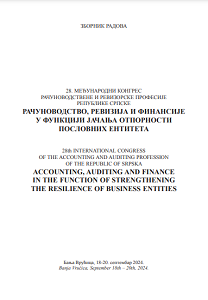ВЈЕШТАЧКА ИНТЕЛИГЕНЦИЈА У СЛУЖБИ РЕВИЗИЈЕ ФИНАНСИЈСКИХ ИЗВЈЕШТАЈА?
ARTIFICIAL INTELLIGENCE IN FINANCIAL STATEMENT AUDIT SERVICE?
Author(s): Mirko Andrić
Subject(s): Media studies, Business Economy / Management, Accounting - Business Administration, ICT Information and Communications Technologies
Published by: Savez računovođa i revizora Republike Srpske
Keywords: accounting reporting; artificial intelligence; auditing; digitalization; audit application software;
Summary/Abstract: The changes brought about by digitalization are visible in all spheres of human life. Accounting, a faithful companion in the economic environment, could not remain outside these processes. The benefits, challenges, and limitations that digitalization brings to the accounting profession, along with auditing and artificial intelligence, are the focus of our attention. For effective business information management, information is of critical importance. Timely, truthful, and reliable information is primarily generated by accounting, or more precisely, by accountants. Their quality and credibility are further enhanced by auditing. The essence, philosophy, and meaning of accounting do not change regardless of the significant difference between manual (copy-based) accounting and the modern digital era. Digitalization enables faster, more efficient, and more comprehensive data collection, selection, processing, and report generation in various forms. On the other hand, there is a pronounced limitation of so-called informational entropy when the volume of information and data overwhelms the system. It used to be difficult to obtain certain information. Today, the core problem lies in the ability to find the “right” (needed) information in the “sea” of available data. It is ungrateful to make predictions about what will happen, even soon. However, we are confident that the era of digitalization and artificial intelligence will not reduce the role of accountants to merely perform simple data entry operations. On the contrary, the role of accountants will increasingly shift towards becoming accounting experts. This will require new knowledge and skills from the members of the profession. The development and implementation of artificial intelligence, in our opinion, will contribute to the quality of audit research and increase the reliability of control and substantive testing. The essence, form, and purpose of the independent auditor’s report will not change in the foreseeable future. The auditor’s opinion will be reached more reliably. We hope that with the development and implementation of artificial intelligence, humanity will not renounce its intelligence.
- Page Range: 35-48
- Page Count: 14
- Publication Year: 2024
- Language: Serbian
- Content File-PDF

